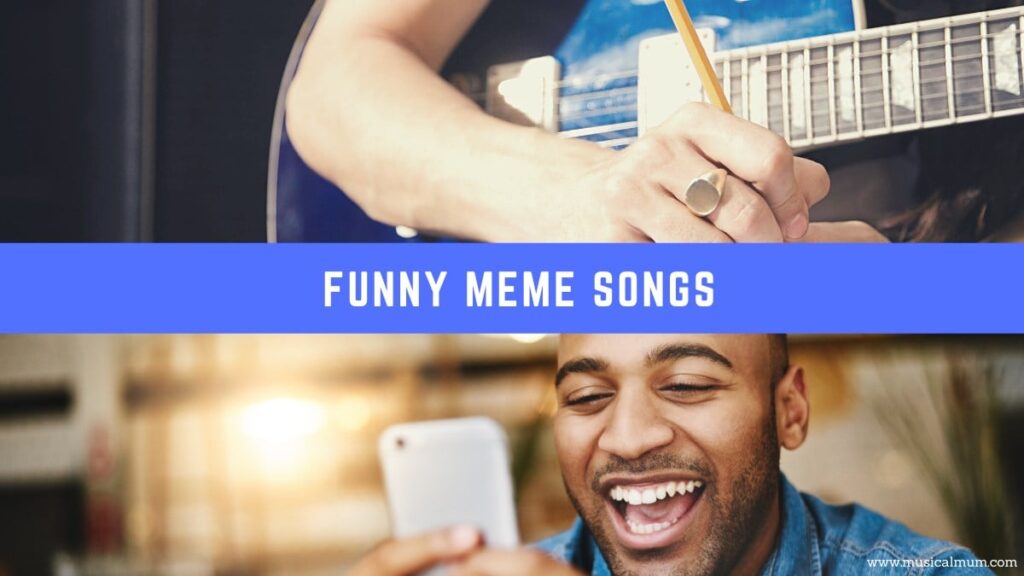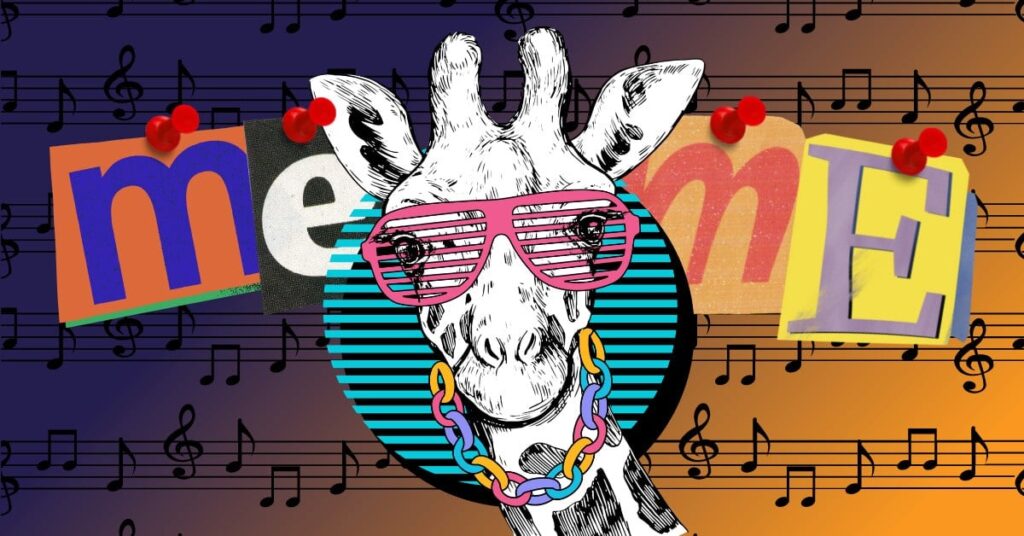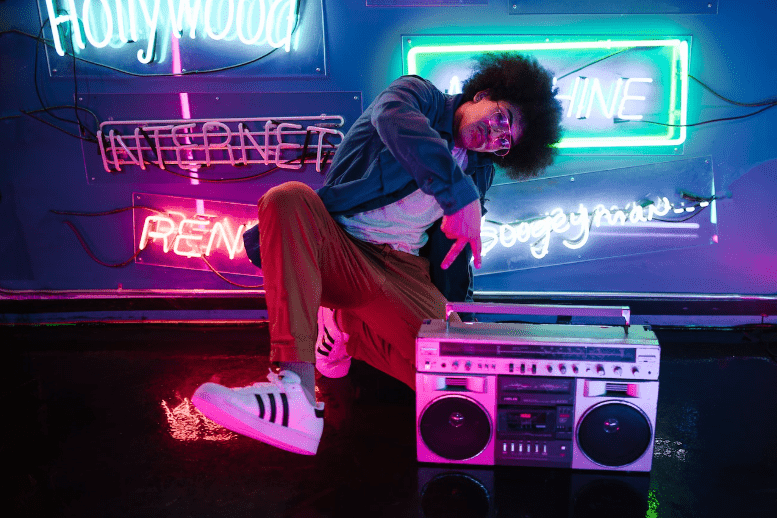

This article takes a humorous look at 20 meme songs that have gained popularity on the internet. From the infamous “Never Gonna Give You Up” by Rick Astley to the catchy “Gangnam Style” by PSY, these songs have become viral sensations over the years. Imogen Heap’s haunting “Hide and Seek,” The Killers’ beloved anthem “Mr. Brightside,” and Vanessa Carlton’s whimsical “A Thousand Miles” also make the list. The article not only explores the songs themselves but also delves into the various ways they have been used in memes, covers, and parodies. It highlights the internet phenomenon of rickrolling and the infectious fame of the Kiki challenge inspired by Drake’s “In My Feelings.” Ultimately, this article celebrates the universal joy found in funny meme songs and the unifying power of music.

“Never Gonna Give You Up” is a song by British singer Rick Astley, released in 1987. It quickly gained popularity, reaching the top of the charts in multiple countries. The pop single became an anthem of the late 80s and is still beloved by fans today.
The song’s viral internet fame began in 2007 with the phenomenon known as “Rickrolling.” This involves tricking someone into clicking a link that leads to the music video for “Never Gonna Give You Up” instead of the expected content. The unexpected Rick Astley appearance created plenty of laughs and became a widespread internet joke.
The popularity of “Never Gonna Give You Up” skyrocketed as a result of the Rickrolling phenomenon. It became an internet meme, with people using the song to prank others or to simply create a humorous surprise.
The Rickrolling trend took off on various social media platforms and even spread into real-life events. It became a common prank to disguise the link to a popular video or article with the song’s YouTube URL. This led to countless unsuspecting victims being “Rickrolled.”
The song’s infectious chorus and catchy melody lent themselves perfectly to remixes, parodies, and covers. Internet users would often create their own versions of the song, incorporating different musical styles or humorous twists. This further contributed to the song’s online presence and cemented its status as a meme.
“Gangnam Style” is a song by South Korean artist PSY, released in 2012. The track became a global sensation, achieving unprecedented success in the Western music industry for a non-English language song.
PSY’s unique blend of K-pop and hip hop, along with his eccentric dance moves, captured the attention of millions around the world. “Gangnam Style” quickly became the most-watched video on YouTube at the time, surpassing one billion views within months.
The infectious dance moves featured in the music video for “Gangnam Style” added to its viral appeal. The iconic “horse dance” became a popular trend, with people attempting to imitate PSY’s energetic and comical performance.
The song’s catchy chorus and memorable lyrics also led to numerous parodies and remixes on the internet. These ranged from humorous lyrical changes to full-blown reimaginings of the entire song. The blend of humor and cultural references in these memes helped “Gangnam Style” maintain its widespread popularity within the digital realm.

“Hide and Seek” is a song by British singer-songwriter Imogen Heap, released in 2005. The hauntingly beautiful composition resonated with listeners due to its emotionally charged lyrics and unique vocal manipulation.
The vulnerable and introspective nature of “Hide and Seek” struck a chord with audiences, leading to its popularity within niche music circles. Its inclusion in various TV shows and movies further contributed to its recognition and continued relevance.
The atmospheric quality of “Hide and Seek” made it particularly suited to being manipulated and remixed. Internet users began creating memes utilizing the song’s distinctive vocal effects to add humor or surprise to videos and audio clips.
Cover versions of “Hide and Seek” also gained traction, as fans of the song showcased their own interpretations. These covers ranged from traditional renditions to imaginative reworkings of the original track. Together, the viral memes and covers kept “Hide and Seek” in the online conversation, reaching wider audiences and solidifying its position within popular meme culture.
“Mr. Brightside” is a song by American rock band The Killers, released in 2003. The powerful rock anthem resonated with listeners, becoming one of The Killers’ most successful and enduring hits.
The song’s relatable themes of jealousy, betrayal, and heartbreak struck a chord with listeners, contributing to its widespread popularity and long-lasting appeal.
Despite its emotional lyrical content, “Mr. Brightside” found a place within meme culture. Memes referencing the song often centered around the relatable and sometimes dramatic aspects of the lyrics.
Parody versions of “Mr. Brightside” that playfully exaggerated the song’s intensity and storytelling also became popular online. These adaptations provided a humorous twist on the original track and showcased the song’s versatility and enduring popularity.

“A Thousand Miles” is a song by American singer-songwriter Vanessa Carlton, released in 2002. The piano-driven pop ballad resonated with audiences, becoming Carlton’s signature song and a staple of early 2000s pop culture.
The infectious melody and Carlton’s heartfelt vocals made “A Thousand Miles” an instant hit, reaching high positions on various music charts.
The piano intro and memorable chorus of “A Thousand Miles” made it an ideal candidate for internet remixes and memes. Internet users would often take the song’s well-known melody and incorporate it into unexpected or humorous contexts, creating entertaining juxtapositions.
Memes utilizing the song often played with the opening piano riff or the lyrics themselves, providing comedic twists and memorable moments. These remixes and memes allowed “A Thousand Miles” to maintain its relevance and reestablish itself within meme culture’s collective consciousness.
Rickrolling refers to the internet phenomenon of surprising someone with a link to Rick Astley’s music video for “Never Gonna Give You Up” instead of the expected content. This prank became popular in the mid-2000s and quickly spread across various online platforms.
The origins of Rickrolling can be traced back to an initial prank on online message boards, where users would deceive others by providing a misleading link. Rick Astley’s music video, with its catchy tune and unexpected appearance, quickly became the go-to prank for internet users looking to catch others off guard.
Rickrolling had a significant impact on internet culture. It became a trending topic, with people eagerly sharing their experiences and reactions to being Rickrolled. The surprise factor and the ubiquitous nature of “Never Gonna Give You Up” made it an enduring meme that continued to gain popularity over the years.
Countless internet users created memes and parodies based on Rickrolling. These ranged from remixes and mashups to visual gags and humorous adaptations of the music video. The humor and nostalgia associated with Rickrolling have helped it remain a beloved and influential meme long after its initial surge in popularity.

“In My Feelings” is a song by Canadian rapper Drake, released in 2018. It quickly became a chart-topping hit and sparked a viral dance challenge across social media platforms.
The catchy beat and relatable lyrics of “In My Feelings” resonated with listeners, contributing to its success in the mainstream music industry.
The “In My Feelings Challenge,” also known as the “Kiki challenge,” involved people recording themselves performing a dance routine to the song alongside a moving vehicle. The trend gained massive popularity, with celebrities, influencers, and everyday individuals taking part in the challenge and sharing their videos online.
The challenge spawned countless memes and parodies, with internet users creatively adding their own humorous twists to the dance routine. From outlandish costumes to unexpected settings, the Kiki challenge became a hilarious and widely shared meme.
“Friday” is a song by American singer Rebecca Black, released in 2011. The pop single gained instant attention, but for reasons beyond the music itself.
The song’s simple and repetitive lyrics, combined with Black’s youthful energy, led to widespread criticism and mockery. Despite the negative reception, “Friday” became a viral sensation and garnered millions of views on YouTube.
“Friday” quickly attained meme status due to the overwhelmingly negative response it received. Internet users would often mock the song’s lyrics and production value, creating parodies and remixes that exaggerated its perceived shortcomings.
While the initial focus was on the ridicule, the controversy surrounding “Friday” brought attention to the impact of online bullying and the power of internet culture to amplify criticism. The song’s unexpected viral success highlighted the phenomenon of “so bad, it’s good” and exemplified the democratization of music through digital platforms.

“All Star” is a song by American rock band Smash Mouth, released in 1999. The upbeat and energetic track quickly became a chart-topping hit and a cultural staple of the late 90s and early 2000s.
The song’s catchy melody and uplifting lyrics resonated with audiences, solidifying its place as one of Smash Mouth’s most recognizable and beloved songs.
The connection between “All Star” and the animated film “Shrek” propelled the song to even greater popularity. It became synonymous with the film’s opening scene and gained a new audience through its inclusion in the soundtrack.
The association with “Shrek” led to “All Star” being used in countless internet memes. The song’s lyrics and musical composition allowed for creative remixes, mashups, and parodies. From humorous lyrical changes to unexpected musical combinations, the internet community found immense joy in creating content based on “All Star” and its ties to the lovable green ogre.
“It’s Everyday Bro” is a song by American YouTuber and influencer Jake Paul, released in 2017. The track gained significant attention, albeit mostly negative, due to its repetitive lyrics and perceived arrogance.
Critics labeled the song as cringe-worthy and accused Paul of using his platform for self-promotion rather than producing quality music. Despite the backlash, the song became a viral hit among young fans of Paul and amassed millions of views on YouTube.
“It’s Everyday Bro” quickly became a meme due to the overwhelmingly negative reception it received. Internet users would often mock the song’s lyrics, production value, and Paul himself, creating parodies and remixes that exaggerated its perceived flaws.
The controversy surrounding the song contributed to its cultural impact and showcased the power of online communities to shape public perception. The mockery and backlash ultimately revealed the line between genuine artistic expression and opportunistic attempts at fame.
In conclusion, meme songs have become an integral part of internet culture over the years. From Rick Astley’s “Never Gonna Give You Up” to Jake Paul’s “It’s Everyday Bro,” these tracks have entertained and brought laughter to millions of people worldwide. The power of the internet has allowed for the rapid spread and adaptation of these songs, leading to countless remixes, covers, and parodies. Despite their often humorous nature, these meme songs tap into the universal appeal of music, showcasing its ability to bring people together and provide enjoyment. So the next time you come across a meme song, remember to embrace the laughter and appreciate the creativity that emerges from the digital realm. After all, life is better with a catchy tune and a smile on your face.